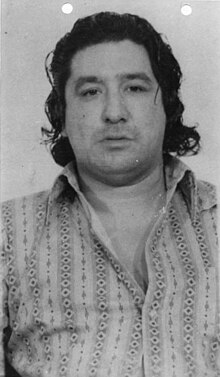Leonard Peltier | |
|---|---|
 Peltier in 1972 | |
| Born | September 12, 1944 Belcourt, North Dakota, U.S. |
| Movement | American Indian Movement |
| Criminal status | Incarcerated |
| Children | 9 |
| Conviction(s) | First degree murder of a federal employee (18 U.S.C. §§ 1111 and 1114) (2 counts) |
| Criminal penalty | Life imprisonment |
Leonard Peltier (born September 12, 1944) is a Native American activist and a member of the American Indian Movement (AIM) who, following a controversial trial, was convicted of two counts of first degree murder in the deaths of two Federal Bureau of Investigation (FBI) agents in a June 26, 1975, shooting on the Pine Ridge Indian Reservation in South Dakota. He was sentenced to two consecutive terms of life imprisonment and has been imprisoned since 1976.[1][2][3] Peltier became eligible for parole in 1993.[4][5] As of 2022[update], Peltier is incarcerated at the United States Penitentiary, Coleman, in Florida.[6]
In his 1999 memoir Prison Writings: My Life Is My Sun Dance, Peltier admitted to participating in the shootout but said he did not kill the FBI agents.[7][8] Human rights watchdogs, such as Amnesty International, and political figures including Nelson Mandela, Mother Teresa, and the 14th Dalai Lama, have campaigned for clemency for Peltier.[9][10] On January 18, 2017, it was announced that President Barack Obama denied Peltier's application for clemency.[11]
At the time of the shootout, Peltier was an active member of AIM, an Indigenous rights advocacy group that worked to combat the racism and police brutality experienced by Native Americans.[12] Peltier ran for president of the United States in 2004, winning the nomination of the Peace and Freedom Party, and receiving 27,607 votes, limited to the ballot in California. He ran for vice president of the United States in 2020 on the Party for Socialism and Liberation ticket with Gloria La Riva as the presidential candidate, as well as tickets for other left-wing parties and on the ballot of the Peace and Freedom Party. For health reasons, Peltier withdrew from those tickets on August 1, 2020.[13][14][15]
He is of Lakota, Dakota, and Anishinaabe descent, and was raised among the Turtle Mountain Chippewa and Fort Totten Sioux Nations of North Dakota.[11]
- ^ "United States v. Peltier, 189 F. Supp. 2d 970 (D.N.D. 2002)". Justia Law. Retrieved July 2, 2020.
- ^ Leonard-Peltier, britannica.com
- ^ Lewis, Hugh M. Robidoux Chronicles. Trafford Publishing, 2004, p. 195.
- ^ Doctorow, E. L.; Styron, Rose; Styron, William; Vonnegut, Kurt Jr.; Matthiessen, Peter. "United States v. Leonard Peltier | by Peter Matthiessen". The New York Review of Books. Retrieved November 27, 2016.
- ^ "American Indian activist denied parole", Newsday, August 21, 2009
- ^ "Inmate Finder". Federal Bureau of Prisons. Retrieved August 11, 2022. Type name in form.
- ^ Ezzo, Joseph (2013). "The Leonard Peltier Case: An Argument in Support of Executive Clemency Based on Norms of International Human Rights". American Indian Law Review. 38: 35–99.
- ^ Cite error: The named reference
book71was invoked but never defined (see the help page). - ^ "Annual Report: USA 2010". Amnesty International USA. Retrieved July 2, 2020.
- ^ "Top prosecutor in Leonard Peltier case urges clemency in 'extraordinary' move". The Guardian. January 4, 2017. Retrieved July 2, 2020.
- ^ a b "Obama won't commute Native American activist Leonard Peltier". New York Daily News. January 18, 2017. Archived from the original on September 17, 2023. Retrieved March 27, 2018.
- ^ "Leonard Peltier | American Indian activist". Encyclopædia Britannica. Retrieved July 2, 2020.
- ^ "La Riva / Peltier Presidential Campaign Announcement". La Riva Peltier 2020. Retrieved July 2, 2020.
- ^ "Leonard Peltier regretfully withdraws as vice-presidential candidate". Party for Socialism and Liberation. August 2020. Retrieved August 3, 2020.
- ^ Winger, Richard (August 2, 2020). "Party for Socialism & Liberation Alters its Vice-Presidential Nominee". Ballot Access News. Retrieved August 3, 2020.